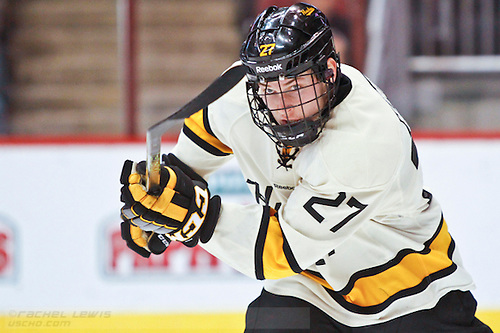
What will the WCHA look like in the near future?
That seems to be the theme to the questions that curious fans and reporters continue to ask following a tumultuous offseason that saw the league announce a series of significant changes.
First, the league announced that it was eliminating the neutral-site championship semifinals and finals. That meant no more Final Five — which had been going on in some form or another since 1993. The semifinals and finals will now be held on campus for the first time since the 1980s.
Later in the summer, the league said it was following the lead of some other leagues in the NCAA by completely eliminating ties from WCHA play and instituting 3-on-3 overtime and shootouts to decide a winner in every game.
All of this would be enough to make one ponder where the league was headed.
But somewhere in between, there was this: Minnesota State applied to the NCHC. Also, both Alaska schools were in dire financial straits and in danger of elimination.
For now, at least, it’s the same-old WCHA that we’ve come to know since realignment — Minnesota State’s application to the NCHC was denied and things seem to be looking better in Alaska.
And that seems to be what the current league administration and coaches want to focus on — this year.
“We are concentrating on making the existing WCHA as strong as it can be for our member institutions,” WCHA commissioner Bill Robertson said during the league’s annual media conference call last month. “We want to be proactive and progressive. We are evolving, and adapting, and we are thinking outside the box when necessary.”
Both of the changes in the league competition for this year — playoff home ice and new overtime rules — reflect that “outside the box” thinking. And the league’s coaches agreed with Robertson that shaking things up is good for the health of the WCHA — a conference that had just one NCAA tournament berth last season.
“I’m looking forward to the changes,” Michigan Tech coach Mel Pearson said.
“I’m really looking forward to on-campus sites,” Ferris State coach Bob Daniels added. “It’s better when you can get more of your student fans into the games and I think it will bring some electricity to the game itself.”
Daniels’ team greatly benefitted from last season’s Final Five location — Grand Rapids is about 60 miles from the Ferris State campus in Big Rapids, Mich. The No. 4 seed last season, they beat top-seeded Michigan Tech and No. 2 seeded Minnesota State to claim the Final Five title and the league’s automatic tournament berth.
The previous format was played over two weekends. The first round was a best-of-three playoff series, which each higher seeded team hosting, followed by a single-weekend, single-elimination semifinal and final round all at the same neutral location.
The new format adds an extra weekend to the conference tournament. The semifinal rounds will also be best-of-three and will be hosted by the two highest-seeded teams.
The championship round is now a single-game at the home rink of the top seed.
That, coupled with the new overtime regulations, has the league’s coaches getting excited.
“I think the overtime will bring a lot of excitement to our buildings, and I know the players are looking forward to it. I think it’s a real good move by our league,” Michigan Tech head coach Mel Pearson added. “You’re going to find some very tightly contested games because everybody wants to make the home ice in the playoffs, especially since you get to host beyond the first round. I think that’s a progressive, exciting move by our league.”
Previously, when games ended in a tie after a five-minute overtime period, each team would receive a point in the standings.
Now, teams will play an additional five-minute, sudden-death, 3-on-3 overtime period. If there is still no winner at the end of five minutes, the game will be settled in a sudden death shootout.
As a result of the elimination of ties, each league game will now be worth three points. Regulation and 5-on-5 overtime wins will be worth three points each, while 3-on-3 and shootout winners will earn two points and losers one point.
The new points structure will, at the very least, add a new twist to a conference that has traditionally been very evenly-matched in the past few seasons since realignment. Last season the gap between first place and third was two points and the gap between fourth place (or home ice) and eighth place was 10 points.
“With some of the new additions that we have had as far as our league policies and playoff structure, I think that’s going to be exciting for our league,” Minnesota State coach Mike Hastings said. “And I think the way that we’re going to eliminate some of the ties is also exciting.”
So how will that play out on the ice?
Bowling Green was the unanimous pick by both the coaches and media to win the league. But both Tech and Minnesota State got some votes, too.
Defending tournament champion Ferris will likely have a say in how that goes, as will some solid teams in the middle of the conference like Northern Michigan and Bemidji State.
“It was very difficult as a coach to sit down and pick these teams,” Daniels said. “I thought there was a grouping with the top four or five teams that were difficult to separate and as you moved on through the standings, I think any number of teams you look at, and if things go the right way for them, things could be very different at the end of the year.”
So what will the WCHA look like two, three or even four years in the near future?
Who knows?
Heck, it’s impossible to tell what it will look like at the end of the season.
“When you take a look at the poll, not only the media, poll but the coaches poll, it’s going to be very tight,” Bemidji State coach Tom Serratore said. “I think in my 15 years as a head coach, from a preseason standpoint, it’s probably going to be the tightest logjam in March that I’ll ever see as a coach. Maybe the season will dictate that differently, but on paper right now early on, every weekend, every game is going to be very tight.”


